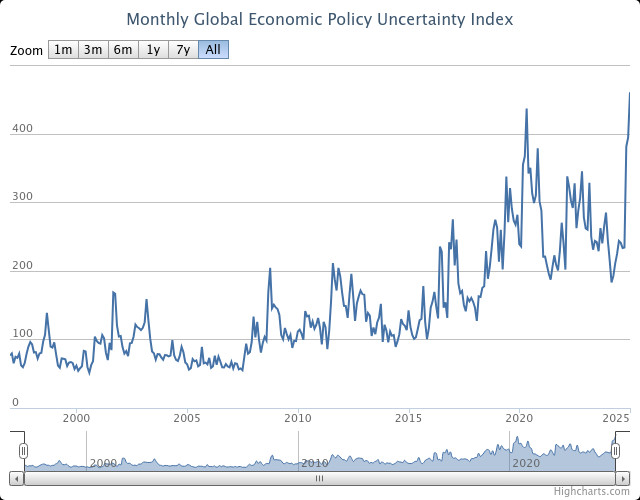Recession of 2025
-
Recessions are always identified six or so months after the economy entered one. When recession is declared, sometime over the summer, I suspect they will identify February of 2025 as the official start. That means we're already in it.
Why do I think so?
https://www.conference-board.org/topics/consumer-confidence
Consumer sentiment is tanking. Uncertaintly about the future is soaring. Uncertainty blasts business investment and consumer spending on big ticket items.
Inflation expectations have risen into 3%+ levels. Certainly not the end of the world, but the Fed won't lower rates. If federal firings continue, we will likely see meaningful macroeconomics effects across many states.
-
Recessions are always identified six or so months after the economy entered one. When recession is declared, sometime over the summer, I suspect they will identify February of 2025 as the official start. That means we're already in it.
Why do I think so?
https://www.conference-board.org/topics/consumer-confidence
Consumer sentiment is tanking. Uncertaintly about the future is soaring. Uncertainty blasts business investment and consumer spending on big ticket items.
Inflation expectations have risen into 3%+ levels. Certainly not the end of the world, but the Fed won't lower rates. If federal firings continue, we will likely see meaningful macroeconomics effects across many states.
@Piano-Dad said in Recession of 2025:
we will likely see meaningful macroeconomics effects across many states.
P-D what does that mean? IOW what is a macroeconomics effect?
-
It just means something like ‘the broader economy’.
Macroeconomics deals with GDP, inflation, price levels, unemployment rates, labor supply, etc. Big picture stuff
Microeconomics deals with widgets, production functions, input costs, etc Things that affect a product or a business. IOW smaller scale stuff.
-
Macroeconomic effect --- rise in national unemployment rate, rise in jobless claims, decrease in aggregate consumption spending (which is roughly 70% of GDP), declines in overall business investment (another 20% of GDP and one that is volatile). A decrease in business investment often leads a classic expectations-driven recession.
If we slip into a recession I don't expect the Fed to be of much help. We probably won't see another quantitative easing because they'll be more focused on rising inflation. The other big tool of macroeconomic policy is fiscal. Democrats have been very good at significantly boosting federal spending to counter temporary fear-driven retreats by consumers. I'm sure Mike Johnson is preparing a bill to pump a trillion $$ into the hands of low and middle income Americans to support their consumption .....



